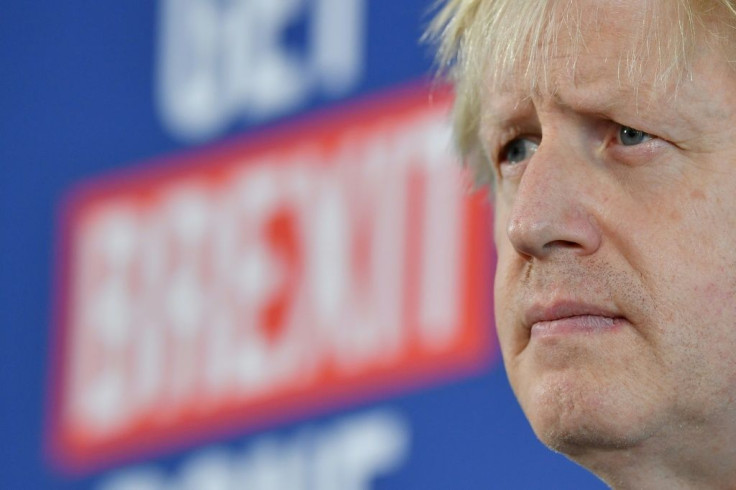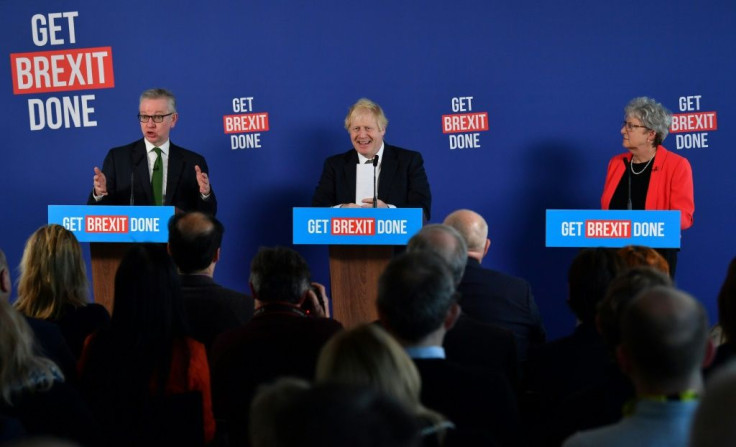UK PM Calls In Referendum Team For Brexit Election Pitch

Prime Minister Boris Johnson made a pitch to Brexit-backing opposition voters Friday alongside a former Labour member of his 2016 referendum team, insisting only a vote for him in next month's election would get Britain out of the EU.
With just under two weeks to go until the December 12 vote, opinion polls suggest the Conservative leader is heading for a comfortable majority in the House of Commons.
Johnson has promised that if this happens, he will take Britain out of the European Union on January 31, and deliver a new trade deal by the end of next year.
But wooing Brexit-backing voters remains crucial and at a press conference in London, Johnson sought to emphasise that the entire "leave" project hung in the balance.
"If there's a Conservative majority government, we can deliver the change that people voted for," he said.
Johnson stood alongside Tory colleague Michael Gove and Gisela Stuart, a former MP with the main opposition Labour party, who together campaigned for Brexit in the 2016 EU referendum.
Stuart urged Labour voters who wanted Brexit to hold their noses and back Johnson, trying to reassure them that this "does not make you a Tory".
"If we don't get this over the hurdle now and get it delivered, Brexit will not happen. Let's be clear about that," she said.
Britons voted by 52 percent to leave the EU in June 2016, but the process has been strung out as MPs battled over exactly how, when and even if the result should be implemented.
Brexit has been delayed three times this year, most recently on October 31, when Johnson was forced to ask the EU to postpone after failing to get his Brexit deal through parliament.
He is now campaigning for next month's election on a pledge to "Get Brexit Done".
The Conservative leader says that if he wins a majority, he will put his divorce deal to MPs before Christmas on December 25 and leave the EU on January 31.
"No ifs, no buts, we'll get it done," he said Friday.
Labour leader Jeremy Corbyn by contrast has promised to renegotiate the deal and put it to a new referendum within six months of taking office.

Polling suggests Labour is highly unlikely to win a majority, but if Johnson also falls short -- another hung parliament -- then Corbyn could create an alliance with anti-Brexit parties.
"If there is another hung parliament after this election, then the deadlock will continue," Johnson warned on Friday.
This would lead to Brexit being further "delayed, denied", he added.
"Put simply, a vote for any party other than the Conservatives is a vote against change," added Gove.
Johnson announced a plan to introducing new rules on state aid, which he said would make it easier to intervene to help an industry in trouble.
"There will be ways in which we can do things differently and better," the prime minister said.
The announcement risks angering some on the Thatcherite wing of his party.
The economically liberal Institute of Economic Affairs (IEA) said expanding state aid was "veiled support for cronyism", and propping up failing industries would disadvantage new businesses.
It accused the Tories, who also promised new public procurement rules to boost British products, of adopting a "protectionist narrative".
Johnson meanwhile denied that diverging from EU rules on state aid might be incompatible with Britain's hopes of continued privileged access to the bloc's single market after Brexit.
"I'm not in favour of distorting competition, I don't want to see unfair practices introduced, I want to see a level playing field," he said.
Johnson's Brexit deal includes plans for a transition phase until December 31, 2020, when the UK and the EU could strike a new trade agreement.
Few economic experts believe this is possible within 11 months, warning that unless Britain extends the transition phase, it risks a hugely damaging economic cliff-edge next year.
But Johnson again repeated Friday he was "very confident" this new trade deal could be done.
© Copyright AFP {{Year}}. All rights reserved.





















